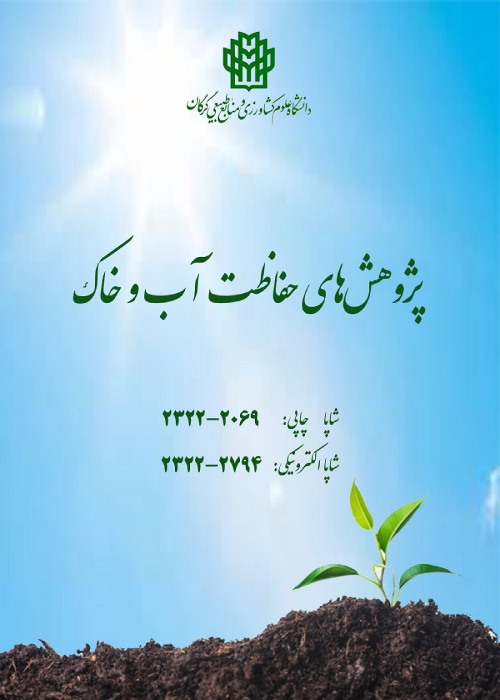Effect of agricultural management on some chemical and biological indicators of soil health
Author(s):
Article Type:
Research/Original Article (دارای رتبه معتبر)
Abstract:
Introduction
Soil health is one of the factors contributing to food security and public health and hence achievement of sustainable agricultural goals. One of the factors affecting soil health is agronomic management. Different agronomic managements (e.g. crop residue management, monoculture system and crop rotation) have different effects on soil health indicators. Therefore this study was designed and conducted to evaluate the effects of different agronomic management on some soil chemical and biological indicators.
Materials and Methods
The study was conducted in Research Farm#2 in Shahid Chamran University of Ahvaz. Three farms with different agronomic management systems were selected. The effect of three agronomic management systems including monoculture cropping system (i.e. wheat), wheat (Triticum)-Mung bean)Vigna radiate) rotation system and residues management on some soil chemical and biological health indicators were studied. The indicators were pH, salinity, microbial respiration, organic matter, active carbon, total nitrogen, available phosphorus (P), potassium (K), Iron (Fe), Zinc (Zn) and Manganese (Mn). The experiment was conducted in a randomized complete block design with four replications. Mean comparison test was performed using Duncan's multiple range test.
Results and Discussion
The results of analysis of variance showed that the crop management type had a significant effect (p<0.01) on soil salinity, pH, organic matter, microbial respiration and activate carbon. Monoculture cropping system caused a significant increased in pH (7.2) and soil salinity (3.5 dS m-1) compared to the other agronomic management systems. Crop residues management increased soil organic matter, microbial respiration and active soil carbon more than crop rotation and monoculture management systems. The soil health indicators were more in crop rotation system than monoculture which shows significant effect of crop rotation compare with monoculture cropping system on improving soil health. The highest and lowest amounts of soil available Fe, Zn, and Mn concentrations were measured in the residue management and the monoculture, respectively.
Conclusion
This study showed that soil salinity, pH, organic matter, microbial respiration and activate carbon can be used as soil health indicators to evaluate the effects of different agronomic managements on soil health. Crop residue management had more significantly effects on improving soil health indicators than crop rotation and monoculture cropping systems. The soil health indicators were more in crop rotation system compare with monoculture which shows the positive effect of rotation compare with monoculture. In general, the results showed that the crop residue management can improve soil health indicators more than crop rotation and monoculture cropping systems.Keywords:
Language:
Persian
Published:
Water and Soil Conservation, Volume:25 Issue: 3, 2018
Pages:
269 to 280
magiran.com/p1890504
دانلود و مطالعه متن این مقاله با یکی از روشهای زیر امکان پذیر است:
اشتراک شخصی
با عضویت و پرداخت آنلاین حق اشتراک یکساله به مبلغ 1,390,000ريال میتوانید 70 عنوان مطلب دانلود کنید!
اشتراک سازمانی
به کتابخانه دانشگاه یا محل کار خود پیشنهاد کنید تا اشتراک سازمانی این پایگاه را برای دسترسی نامحدود همه کاربران به متن مطالب تهیه نمایند!
توجه!
- حق عضویت دریافتی صرف حمایت از نشریات عضو و نگهداری، تکمیل و توسعه مگیران میشود.
- پرداخت حق اشتراک و دانلود مقالات اجازه بازنشر آن در سایر رسانههای چاپی و دیجیتال را به کاربر نمیدهد.
In order to view content subscription is required
Personal subscription
Subscribe magiran.com for 70 € euros via PayPal and download 70 articles during a year.
Organization subscription
Please contact us to subscribe your university or library for unlimited access!



